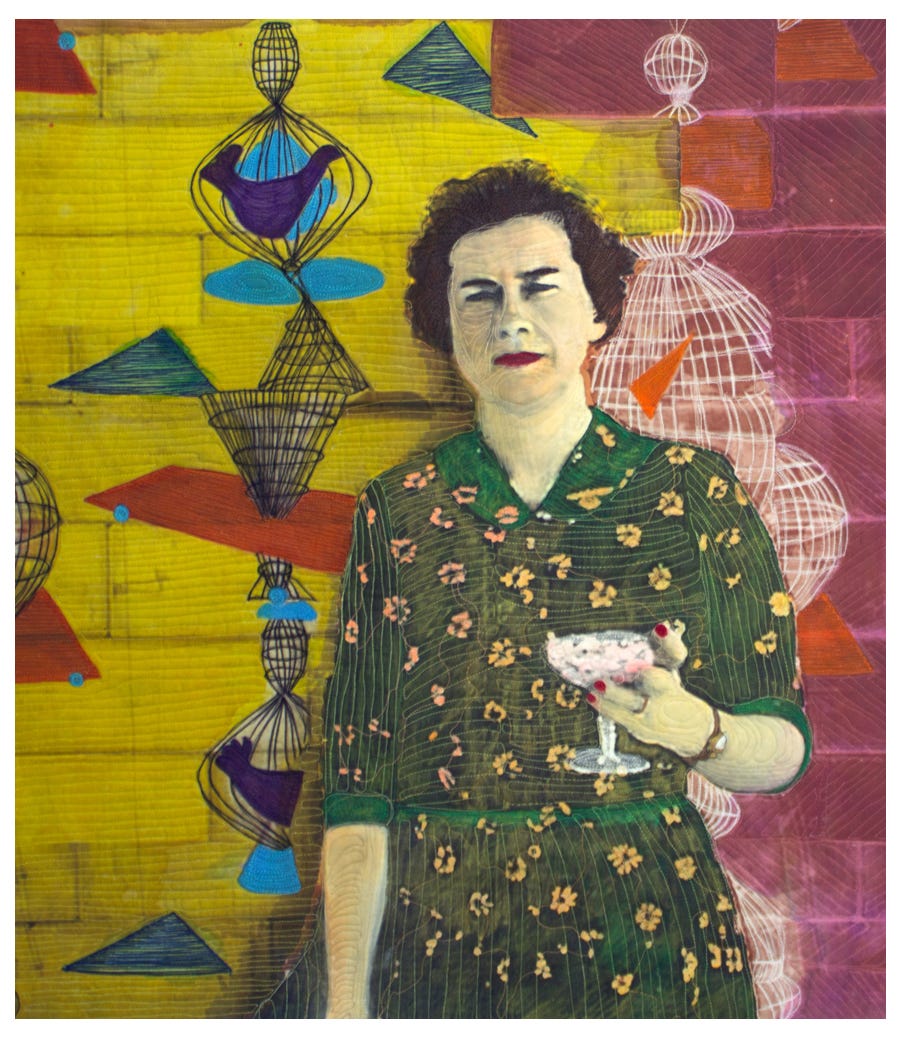Nan is a portrait of my mother. The reference picture I used was taken in the early sixties in Los Angeles where my father’s family had a home in West Hollywood. She is looking pretty hip with her nails done and cocktail in hand.
My mother was the first born in an upper class Irish Catholic family in Chicago. She was born into a culture with expectations from both her family's religion and their social standing. Of course this is true whether you were a boy or a girl, but somehow women have an obligation to be good, while there is an attitude for men that boys will be boys.
The phrase comes from a Latin proverb “sunt pueri pueri, pueri puerilia tractant” which translates roughly to boys are boys, and boys will act like boys. Western societies have been saying some form of “boys will be boys” for at least 2,500 years.
After graduation from an all girls catholic high school, my mother was sent to secretarial school in 1938 knowing her younger brothers would be sent to Catholic Universities. The family had lost much of their wealth during the depression. I believe she took on the role of staying home and contributing her salary to pay househols expenses. Unlike her sisters who got married, she remained single into her 30’s.
Although she was technically a secretary, Nan ended up working for the President of Maybelline and later with the one of three founders of a large consulting firm Booze Allen and Hamilton. By 1950 she made more money than her brothers. She was successful and highly valued in her role, but an opportunity to move up into management would be an impossibility. She was trapped.
In the 1950s women held positions as secretaries, bank tellers or clerical workers, sales clerks, private household workers and teachers. These were low paying jobs. An average yearly salary in 1955 was $1,100 for a woman and $3,400 for a man. The average age of marriage for women in 1950 was 20. It was not uncommon for young women to work in order to put their husband through college and then retire from the workforce to raise children.
Both Nan’s brothers would come home from WWII to complete a college degree and move into “white collar” jobs. (The term "white collar" is credited to Upton Sinclair, administrative, and management workers.) They would easily move up, during the decade following the war; into management. Corporate employment was booming in the 1950's. White men took full advantage of the opportunities and built wealth through real estate. Women were unable to build wealth through home ownership because couldn’t get a mortgage without a man as a co-signer. This remained true until the 1970’s.
My mother understood she had hit the ceiling of opportunity. In 1953 she applied for two jobs comparable to the one she held in Chicago. The first was in Saudi Arabia and the other in Honolulu. Her brothers who worked in the oil industry advised her to avoid Saudi Arabia because it would not be safe for a single woman. She chose to accept a position in the territory of Hawaii.
When she arrived in Honolulu she worked for a large consulting firm; Castle and Cook. Nan went thousands of miles from home not knowing how to drive, never having rented an apartment, and without a social connection. Like most unmarried women she had never been on her own, let alone in a culture far more diverse than the upper middle class community along the North Shore of Chicago. It was a bold move.
When Nan went to Hawaii less than one out ten women lived an independent life. So much has changed. According to the recent census only half the population live with a spouse. The number of single person households has more than doubled since 1960 to 28% of the population. In one study an increasing number of women in their 50’s are choosing to live independently. Interestingly this group has higher levels of happiness than their single male counterparts.
Today I look back and wish I had asked my mom more questions about her decision. What was it like to venture out into new territory? How did her friends process her taking off? Did she feel trapped? Was she over her head when arrived or did this free her to think in new ways? What was her plan B if things didn’t work out? I don’t think I would have had the courage to do what she did and want to know how she got that courage?
Life prevented me from having these conversations. Nan died as the result of a car crash when I was a little over thirty, already married, with a child, working hard in a corporation, and living far away from her.
Of course Nan didn’t remain single. She married within a year of arriving in Honolulu to my father who was much older and quickly gave birth to my sister. She was a stay at home Mom until I went to high school when she worked as secretary at the Catholic School.
My Dad always considered himself a feminist. His favorite sister (Check out the post Aunt Gin) remained unmarried and was very successful. The much admired advisor for his dissertation was a woman. He saw my mother as a highly intelligent and capable person. I saw that too, but also I see the cage of expectations placed around women of her generation.
As her daughter, I have benefited from the feminist movement of the 1960s and 70s. The opportunities open for me were so much greater than for my mom. For that, I am very grateful.






